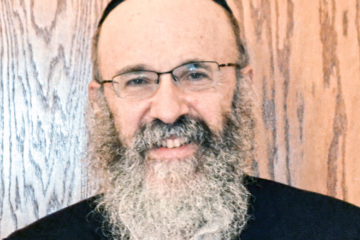Our Judaism & citizenship
By Rabbi Shmuel Klatzkin, Chabad of Greater Dayton

On Rosh Hashanah, the rabbis tell us, we accept God as our ruler. There is something that is extraordinary here — despite all of God’s eminent qualifications, we are instructed that our role is crucial — for God to be sovereign in this world in the way God would like, He needs us to choose Him.
And so it is with human rulers in Judaism: as is clear from the stories of the selection of Saul and later David as king, it was the people’s voice that was decisive.
The European political thinkers, such as Hugo Grotius and John Selden, who, in the 17th century, turned the thought of the West toward democracy — these men looked to the model of what they called the Hebrew Republic.
The spread of Hebrew scholarship brought Selden, a master of the history of English law, to study Maimonides’ great law code to understand how God’s system of government worked and to glean contemporary lessons from it.
As the story is told in Harvard scholar Eric Nelson’s groundbreaking eponymous book on the topic, the study of Scripture, Talmud and halacha (Jewish law) led generations of thinkers toward such ideas as individual freedom and religious tolerance, the foundations of democracy.
This history tells us that our Judaism and our citizenship shouldn’t be estranged from each other. It is true to history and true to the ideals that founded and guided this country that we should employ the moral purpose and direction we find in Judaism to energize and to guide our actions as citizens of this republic.
It was John Adams who famously said: “Our Constitution was made only for a moral and religious people. It is wholly inadequate to the government of any other.” By that he meant that our religion must provide us the insight that all members of the body politic are equally created in the divine image. That is the crucial realization that enables people to govern themselves rather than be forever dependent on other humans to dictate the terms of their society.
There was a time not long ago when people fancied that the role of religion was ever diminishing. In Israel, certainly, Ben-Gurion thought that he could offer significant concessions to the Orthodox community because he believed that it would be swept away into insignificance by the onrushing tides of history.
Keeping in mind the many distinctions necessary between this and the former case, many Westerners dismissed the significance of Islam as a force in the modern world.
And here at home, confident voices spoke of the inevitable marginalization of religion from the culture and from public discourse, and tried to stamp out its every influence on politics.
Whatever one’s own personal religious views, there is no denying the centrality of religion in the affairs of the world today.
The questions before us are: do we speak from the center of our own deepest awareness? Do we have the courage to ground the whole of our lives on our first principles? Can we proceed, as Jefferson asked, with “a firm reliance on the protection of divine providence…(to) mutually pledge to each other our lives, our fortunes and our sacred honor?”
We face grave decisions as we approach the ballot box this year. How do we best make America a prosperous society? How do we protect and enhance the equality under law and the access to opportunity that has made this country a place of hope? How do we protect this country from those who mean it harm? How do we aid the security of Israel from the no-longer hidden threat of its extinction (God forbid)?
As we talk over the choices that lie in front of us, as we write emails to friends and letters to the editor, follow the pundits on the blogs or in print or listen to radio or television chatterers, we know that we best serve the interests of the world, of America, or of the Jewish people not by sealing our religion away in a box, but by engaging it, for it alone gives us the perspective to meet today’s challenges.
The survival of America’s promise and of our people Israel depend on it. From the unique standpoint where God has placed each one of us, let us each consult our Torah’s teachings, measure ourselves against God’s timeless expectations, and rise to our duties as citizens of this country and children of the Covenant.




